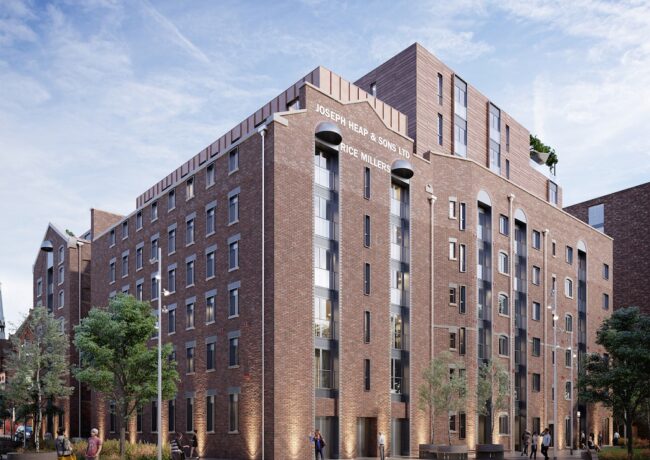Commentary
COMMENT | The growth challenge facing Liverpool
 If the city’s ambitious plans for high-rise apartments and office development are to be delivered, Liverpool’s economy needs to grow. Who will deliver the jobs the city needs, asks Richard Cook.
If the city’s ambitious plans for high-rise apartments and office development are to be delivered, Liverpool’s economy needs to grow. Who will deliver the jobs the city needs, asks Richard Cook.
We’re already more than half way through 2017 and there’s no doubt that nationally there is still a lot of uncertainty about what the future holds – be it how long the minority government lasts or how successful the Brexit negotiations are going to be. Liverpool City Region now has its metro mayor in the shape of Steve Rotheram and while this should remove many of the uncertainties at a local level, he is still faced with addressing a long list of challenges.
I studied in Liverpool for four years and since I left in 2003, large parts of the City Region have been transformed – notably the city centre through Liverpool One. More than 600,000 now work in the area and its economy generates around £30bn per annum in economic output, having grown by almost £2.5bn over the last two years. This was a bigger rise than Greater Manchester (4.3% versus 3.3%) but while it is clearly an encouraging sign, Liverpool City Region still faces several challenges – notably:
- Population growth and an ageing population: From 2006 to 2016, the City Region’s population has grown by 2.9% (44,000 additional people), below the increases seen in the North West (4.6%) and UK (7.9%). Like many other parts of the country, the majority of growth has been accounted for by a rise in the number of people aged 65 and over.
- Employment growth lags behind other parts of the country: While 20,000 jobs were created in the City Region between 2010 and 2015, the increase equates to a rise of 3.4% and this is lower than the corresponding rises seen in the North West (4.9%) and Great Britain (6.8%).
- Raising productivity: As of 2015, gross value added per hour worked was 91% of the UK average in Liverpool City Region.
- Lower levels of entrepreneurship: As of 2015 there were around 70 new business start-ups in the City Region per 10,000 working age population. This was an improvement on the rate of 64 in 2014, but well below the likes of Greater Manchester (90 per 10,000 WAP) and the North West and UK averages of 81 and 93 respectively.
- Skill levels of the resident population: The City Region’s skills challenge is two-fold – it needs to increase the number of people with higher level skills and reduce the number of people with no qualifications. Almost one third of working age residents now have an NVQ 4+ qualification (which includes degrees), but this is still below the UK average of 38%. There are also more than 115,000 people in the City Region with no qualification.
The challenges I’ve outlined above aren’t unique to Liverpool City Region. If you look at the other five areas that have elected a metro mayor, they will all in some way shape or form be facing similar issues. For the City Region, there are a number of growth priorities for the Mayor to focus on and I’ve outlined three issues to consider in this respect:
- Attracting people and jobs: The pace of jobs growth needs to increase in the City Region and this means creating employment and attracting investment in sectors such as digital/creative, life sciences, financial & professional services, logistics etc. Developments at Liverpool2 and the Knowledge Quarter will help in this respect, with the latter becoming home to the Northern HQ of the Royal College of Physicians in 2020. The HQ is expected to create 100 jobs and this should help in attracting people to the area and in retaining graduates – there are more than 50,000 Higher Education students studying in Liverpool.
- Improving the commercial property offer: To attract people and jobs, the City Region needs to have a commercial property offer that meets the needs of the future workforce and can bring jobs to the area. Long-term projects such as Peel’s Liverpool Waters scheme will play a significant role, but in the short-term more needs to be done on improving the development pipeline for office space – especially in the city centre. This can help in attracting investment from outside the area and allow existing businesses to expand. In Chester for example, the council and Muse Developments went into partnership on a new 70,000 sq ft of grade A office space, City Place, and the council agreed that if it wasn’t let they would buy it at a pre-agreed price. It is good to see something similar proposed in Liverpool at Pall Mall where Kier Property and CTP are working with the council to build 400,000 sq ft of offices
- Promoting Liverpool: One of the things that Greater Manchester has done well in recent years is to promote itself, both nationally and internationally. Liverpool already has a strong tourism and heritage offer which it promotes and it needs to invest more in marketing the wider offer to boost its profile. It’s shown it can do this with the Royal College of Physicians Northern HQ, beating off competition from Manchester and Leeds, and successes like this should be used to promote the City Region as a destination for people, jobs and business – its recently announced bid to bring Channel 4 to Liverpool being a prime example of this.
Richard Cook is associate in economics at Pegasus Group.





If the Mancs can do it with so can we.
By Scouse B
Liverpool’s renaissance has been built on a bedrock of mountains of government money going back to the 80s and earlier in fact, all the way back to the birth of regional policy. Liverpools favoured city status needs to continue if we are to maintain this momentum.
Let’s get Channel 4 up here too.
By Analyst
Very well rounded and considered article; I hope the leaders of the LCR read this and take actions forward.
There has been a growth of colleges offering logistics and seafaring courses around LCR at Hugh Baird, Knowsley and Widnes. Wirral and Wirral Waters have also set a good precedent. Hopefully this will help plug the skills deficit.
Office space; new bespoke buildings are needed as older assets are converted to residential uses. There are bags of potential around Pall Mall and Moorfields with the cleared car park sites. These really are a blot on the commercial district and surely something can be done.
Opportunities are bountiful; we just need to seize the day.
By Anon
What is needed the most is for the Politicians to get their act together and not bicker and fight amongst themselves in public. Presenting a strong and united front to attract investment and create a positive image of the area and not dwelling on
shortcomings of any kind.
By Liverpolitis
Liverpool is looking after itself and not the city region.
By halton guy
A good article, need to be more than an economy based on cheap retail and visitor jobs.
By Mark Gilbertson
Well written piece but recurring themes. Skills are a big issue, I don’t know why but they have been since 1980s when I left school in Walton. Knowledge and financial sectors etc are fine, but what does a modern logistics sector need and how can we better meet its needs to fuel substantive job growth for inner-urban residents? Are the strategies we have the right ones, probably not given the below trend performance set out above
By SC
Comparative economic indicators are a useful starting point and the article provides a forum for debate. However, as an economist/small business educationalist who has 30 years experience in research/teaching and training the problem is ‘institutionalised’ within ‘structural and cultural’ barriers ( not just unique to Liverpool…although Liverpool is clearly lagging) i am currently in the Far East and on my way home to Liverpool next month) Richard Cook’s article touches the surface of the ‘skills and entrepreneurship’ issues … culturally bound in inequality and lack of long term vision of our leaders. I would recommend our decision makers to visit China/Malaysia/Hong Kong to mention a few. They need to understand how to communicate and bring about change. In Penang, where I have spent the past year Muslim/hindu/ Buddhists and resident communities grapple with global capitalism and run their small businesses side by side. It is a dynamic and amazing display of innovation, diversity and modest prosperity. I am proud of Liverpool and the massive investment that has poured into the city during my life time has transformed it. In the cloud of Brexit, now more than ever leaders, conglomorates and the financial sector need to develop Liverpools ‘social capital’ and not just focus on the economic. An entrepreneurial culture with thrive when communities of people can work side by side and support each other by recognising ‘cultural capital’ as a ‘mainstream asset’. This requires strategic vision built on an understanding of ‘what can we do is different that adds value to all’. Liverpool should not become a homogenous city of shopping malls and same same!!! Variety is the spice of life!!! Anyway im off for my favourite char koay teow and if any one wants the recipe get in touch
By MCourtney
At the University Of Liverpool we don’t have a hard job convincing our graduates to stay in the region, we have one of the highest retention rates outside of London- the problem is not having enough graduate level jobs to keep them here compared to other city regions.
As the number of year in industry degree programmes increases we need more local organisations to offer the 12 month placements and mould the graduates of the future, convincing graduates that Liverpool has something to offer them. Increasingly we are seeing our students being offered placements elsewhere in the country resulting in those students migrating back to that region upon graduation rather than staying in the Liverpool region.
We need more organisations like We Are Nova based at the Baltic Triangle who recruit a large number of placement students and see them as an integral part of their growth.
By Anonymous
We are a city of shops. We are a city with poor transport links. We are a European city in an anti-European country. So while we can organically grow S.M.Es we need more large scale relocations. Channel 4 would be a good start, but Brexit will seriously damage our ability to attract big companies who will be looking at Brexit as a reason to go elsewhere.
By Noblelox
What we need to be doing in the NW is lobbying hard for a schools policy similar to the Blair London challenge. Schools in this region for ordinary peopls are just not fit for purpose.Until we start educating our children properly,we will not get the high skilled jobs here.That is not just Liverpool,but most of the NW.Knowsley I believe doesn’t have one 6th form college?
By Elephant